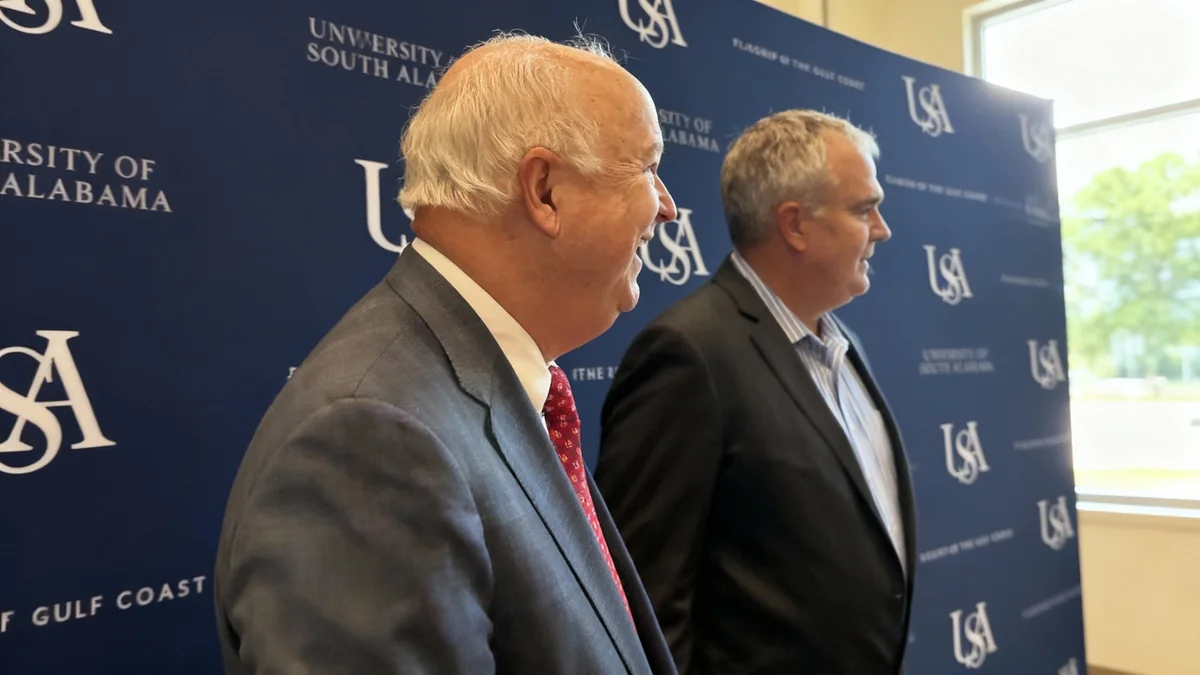The University of South Alabama has forged a significant partnership with Airbus North America, marking what university officials believe is the largest corporate agreement in the institution's 62-year history. This collaboration aims to create educational pathways and training opportunities, directly feeding future talent into Airbus's growing operations in Mobile, Alabama.
The announcement, made on Tuesday, October 21, 2025, at the university's MacQueen Alumni Center, highlights a strategic move to strengthen the aerospace industry's workforce in the region. Airbus, the world's largest commercial plane maker, operates its largest North American assembly plant at the Mobile Aeroplex at Brookley.
Key Takeaways
- University of South Alabama and Airbus North America have formed a major corporate partnership.
- The agreement focuses on education, training, and talent development for Airbus.
- Future expansion at the university's technology park is anticipated.
- Airbus seeks thousands of new employees, including engineers and other professionals.
- The partnership coincides with the opening of Airbus's third assembly line in Mobile.
Building a Talent Pipeline for Aerospace
Robin Hayes, Chairman and CEO of Airbus North America, emphasized the partnership's goal to bridge the gap between academia and industry. He spoke about building a direct path from classrooms to factory floors and engineering teams.
Hayes stated,
“We want to work to build a pathway from the classroom to the factory and into our engineering teams. We want to harness the power of partnership here to conduct industry benchmarking, support curriculum development, and create internships providing Airbus amazing talent.”This initiative is crucial for Airbus as it plans for future growth and innovation.
Airbus in Mobile
- Opened in 2015.
- Employs over 2,000 workers.
- Mobile is the world's fourth-largest commercial aircraft manufacturing hub.
- It trails only Seattle, Toulouse (France), and Hamburg (Germany).
Expanding the Footprint
University of South Alabama President Jo Bonner indicated that the partnership will likely lead to physical expansion on the university's campus. He mentioned potential new buildings and projects at the institution's 23-year-old technology park, located on the northern part of the west Mobile campus.
Bonner confirmed ongoing discussions, stating,
“They will need space. We’ve got some space. They will probably need even more space. They need tens of thousands of engineers, accountants, supply chain logistics people. They are looking to expand their footprint beyond Brookley, and we are certainly a great place to do so.”More details regarding these developments are expected in the coming months.
Focus on Future Aircraft Technology
The announcement closely follows the official unveiling of Airbus's third final assembly plant in Mobile, which took place just eight days prior. This new facility is the second in Mobile dedicated to constructing the popular A320-series of commercial aircraft.
Despite the A320's continued popularity, Hayes highlighted Airbus's forward-looking strategy. The company is already targeting new aircraft designs for the next decade and beyond. He expressed hope that much of the research and development for these futuristic planes will occur through the new university partnership.
A320 Legacy
The A320 airplane, a core product for Airbus, was originally designed in the 1980s. It was considered revolutionary at the time and has remained a popular choice for airlines for over 40 years. Airbus is now looking to innovate beyond this successful design.
Next Generation Aviation
Hayes outlined the company's vision for the next generation of aviation, focusing on advancements in engine technology, wing design, and other critical innovations. These efforts are aimed at preparing Airbus for its next major airline brand, projected to fly in the second half of the next decade.
He posed a critical question about the national workforce:
“We have these amazing opportunities. The demand is there. The U.S. is central to this. But do we have enough people to deliver on that mission as a country? Do we have enough people in the State of Alabama to deliver on what aerospace provides?”This partnership directly addresses that need.
Diverse Career Opportunities
Since its opening in 2015, Airbus’s Mobile plant has grown significantly, now employing over 2,000 workers. The Mobile facility has cemented its status as the world’s fourth-largest commercial aircraft manufacturing hub, following major sites in Seattle, Toulouse, and Hamburg.
Airbus already has established training partnerships, including with the AIDT Aviation Training Center in Mobile, which provides hands-on training for both A320 and A220 aircraft. The company also supports the FlightPath9 workforce pipeline program, specifically targeting high school seniors, offered at Bishop State Community College.
Beyond Engineering
While stressing the need for more engineers, Hayes clarified that the university partnership would train students for a wide array of roles within the company. These include quality inspectors, accountants, human resource professionals, finance specialists, and lawyers, as well as logistics experts.
Hayes noted,
“There is a whole ecosystem of jobs that exists… the career opportunities are immense.”This demonstrates the broad scope of the collaboration and the diverse talent Airbus seeks.
University of South Alabama at a Glance
- Founded in 1963.
- Currently enrolls more than 14,000 students.
- Strategic vision aligns with developing strong corporate partnerships.
A Decade in the Making
President Bonner revealed that the relationship between the University of South Alabama and Airbus has been developing for nearly a decade. He stated that this new agreement aligns perfectly with the university's strategic vision.
Bonner concluded,
“We believe we are a talent machine and we believe in partnership with Airbus and partnering with the world’s most innovative aerospace company.”This long-term engagement underscores the commitment from both institutions to foster regional economic growth and technological advancement.





